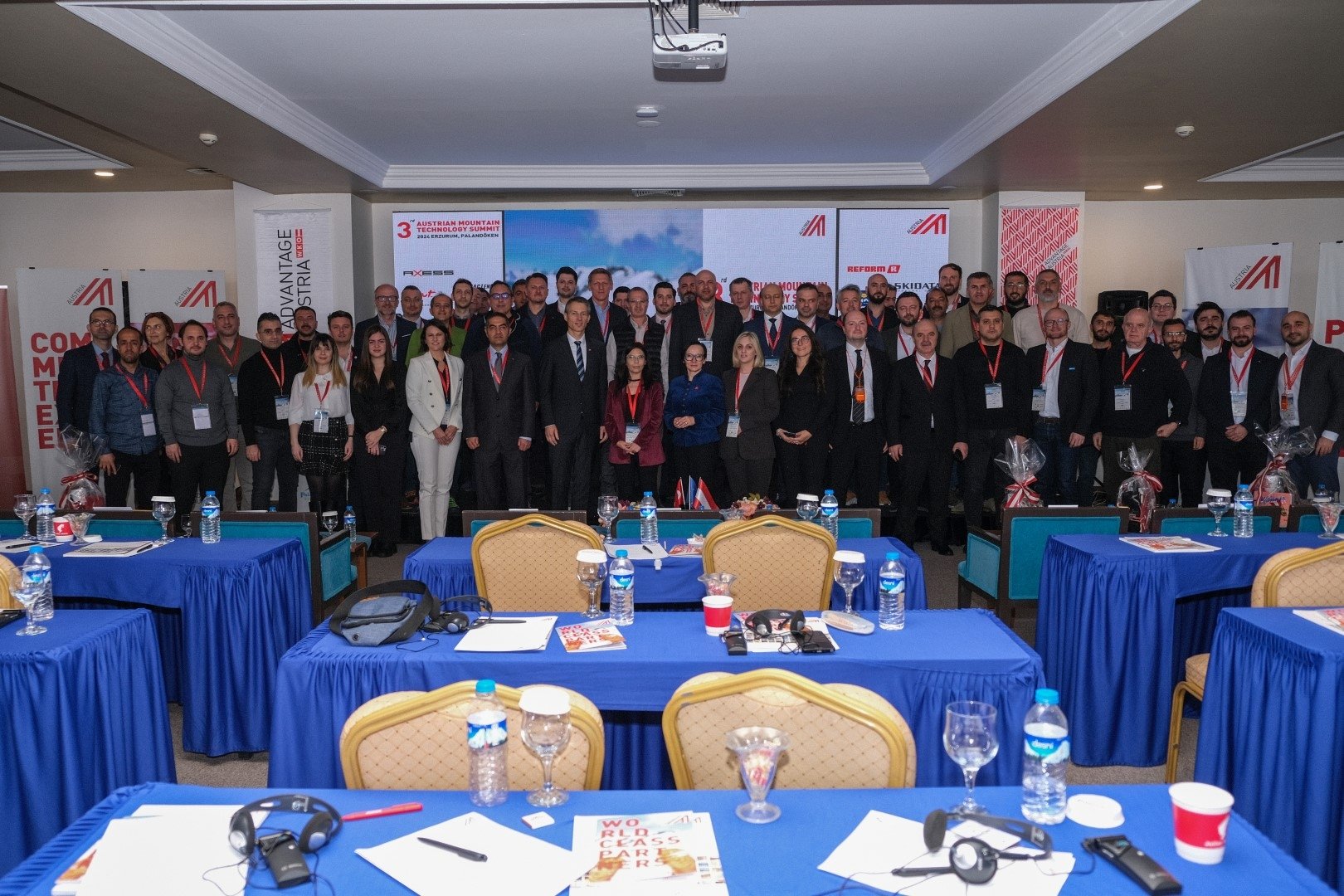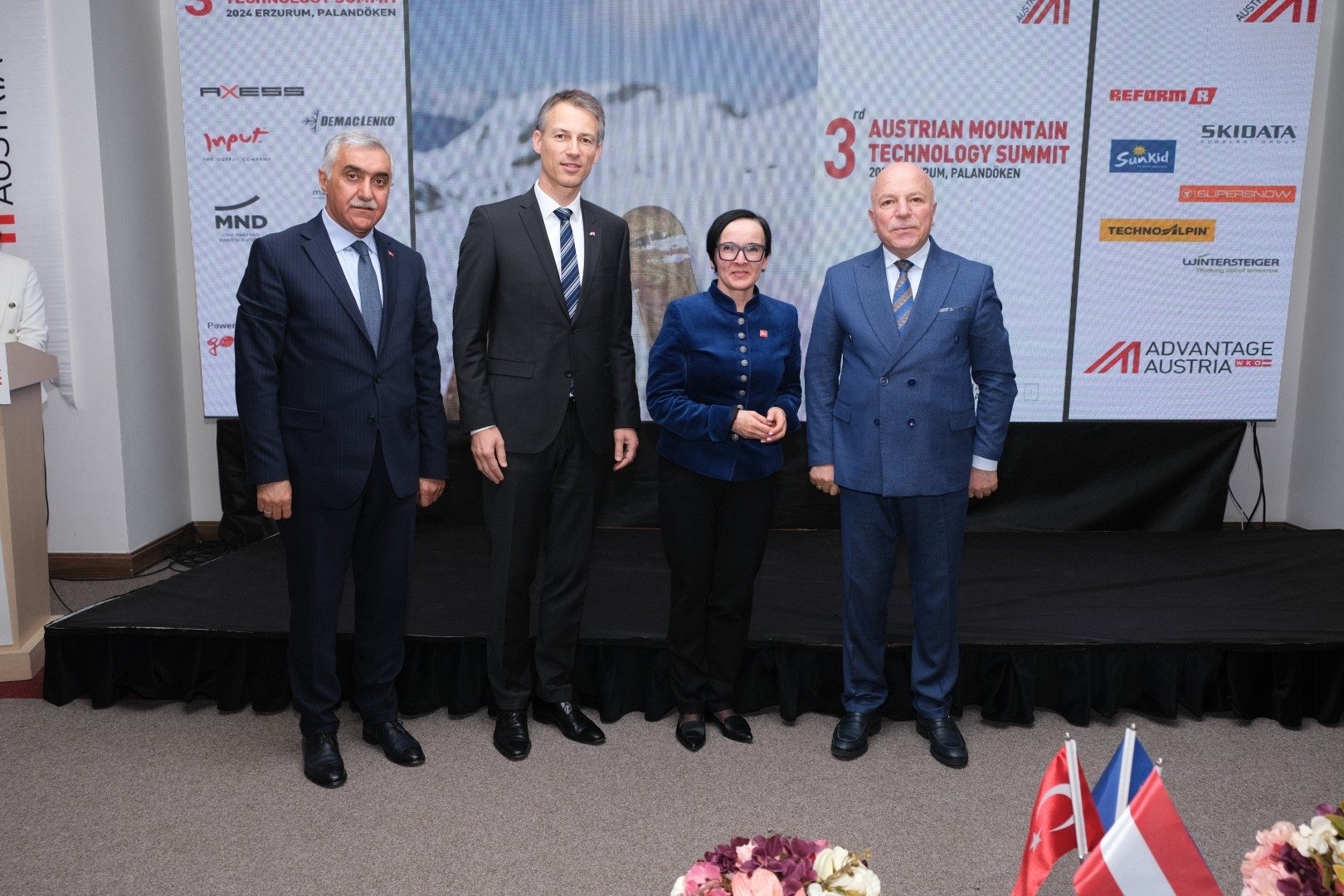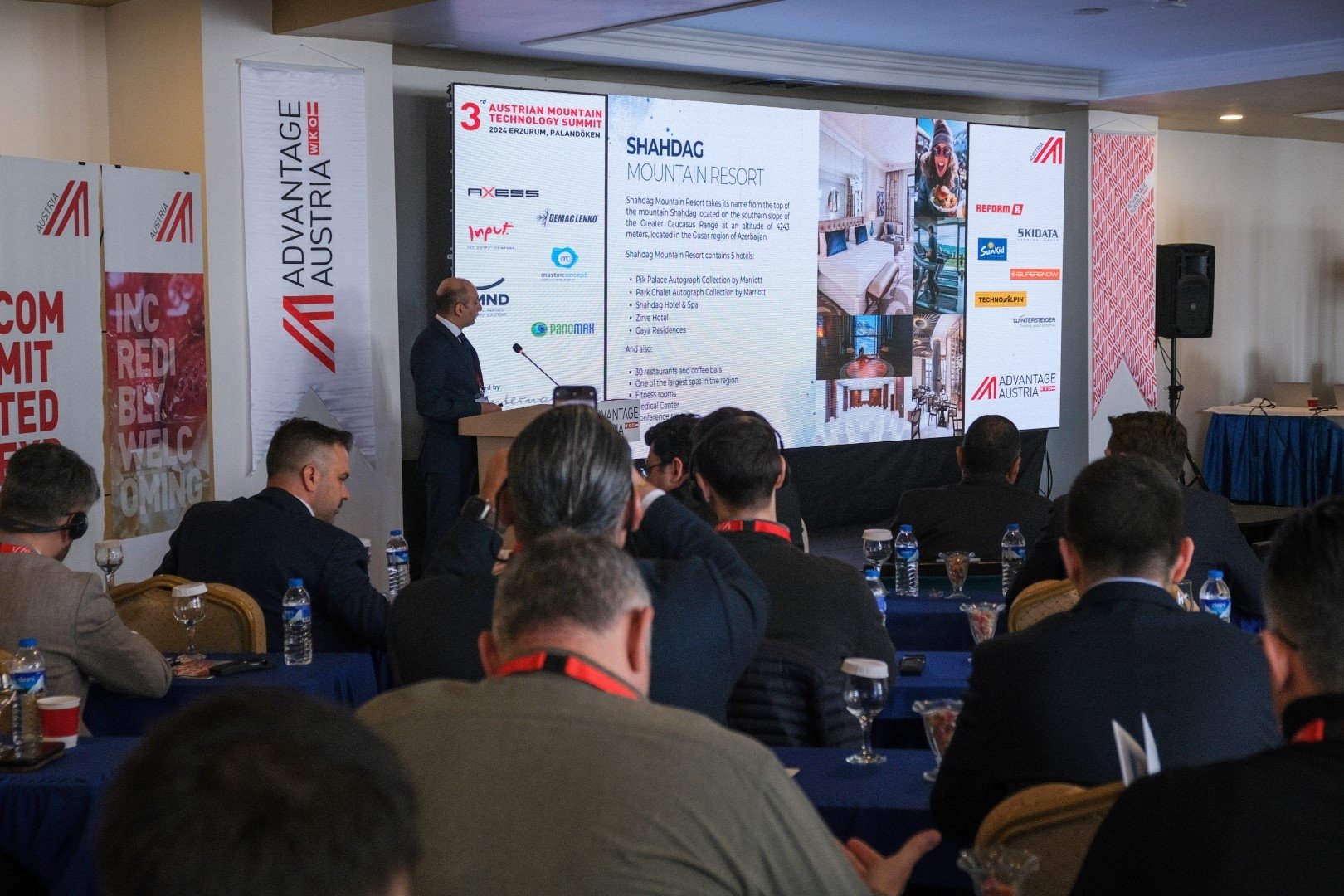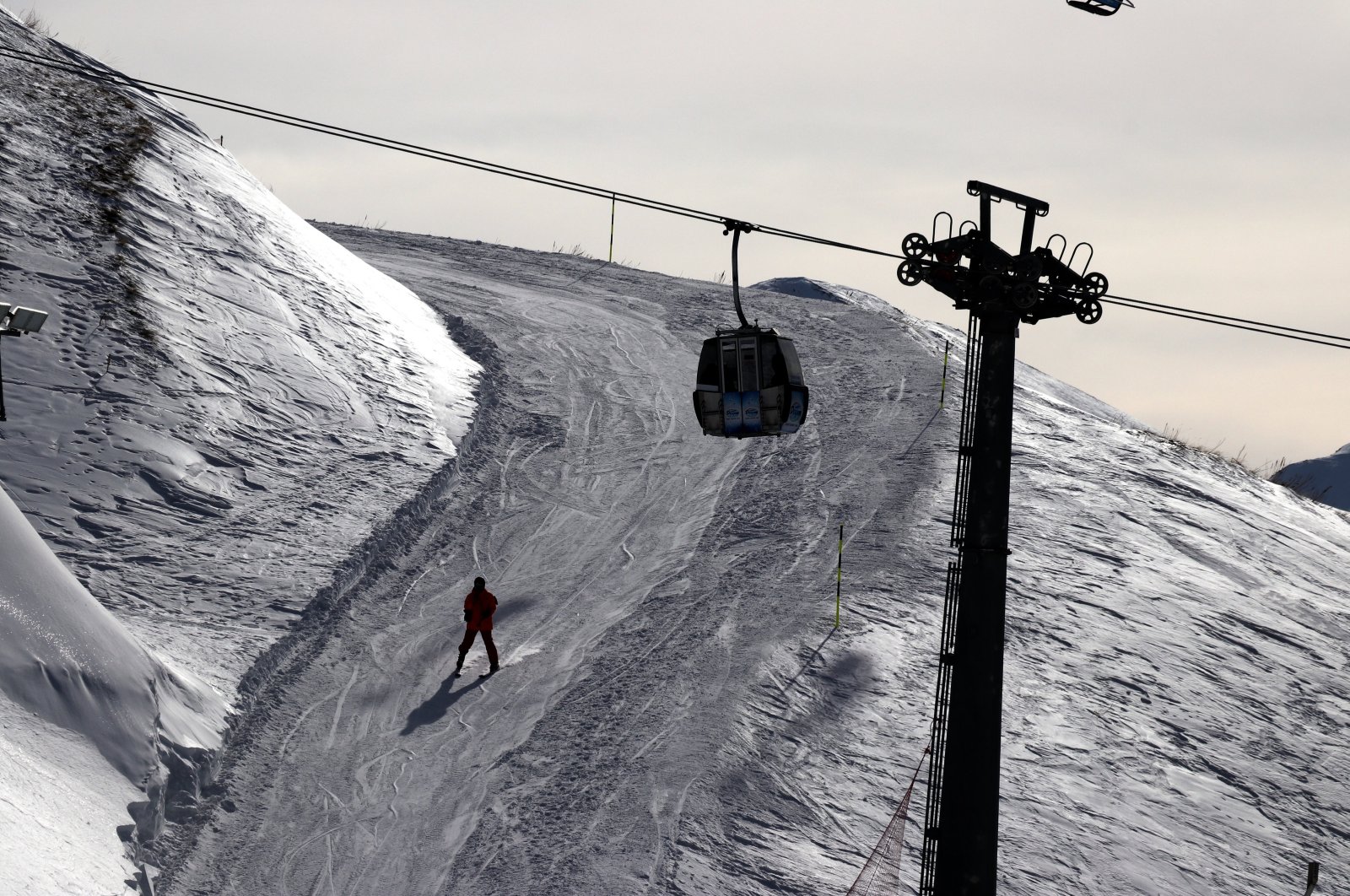Seeking to expand its footprint and make a name for itself outside of summer, Türkiye is looking to leverage Austrian expertise to bolster its winter tourism sector, as highlighted in the recent gathering of Turkish ski resort operators and pioneering infrastructure players from Austria.
Held at Mount Palandöken, one of Türkiye’s premier ski resorts, the third edition of the Austrian Mountain Technology Summit convened from Friday through the weekend to explore avenues for cooperation and investment.
The collaboration underscores Türkiye’s ambition to diversify its tourism offerings beyond the summer season, aiming to tap into the expertise of Austria, renowned globally for its winter sports infrastructure and events.
The summit, organized by the Austrian Trade Office, or Advantage Austria, focused on sustainability and innovation. It aimed to foster partnerships in mountain technologies and discuss strategies to position Türkiye as a prominent winter tourism destination.
Unlike previous years, decision-makers and officials from Azerbaijan and Georgia participated in this year’s event.
Austria is one of the world’s biggest players in ski tourism and, with its Alps, is globally renowned for infrastructure and winter sports events. Decades of experience have enabled the country to undertake the role of a pioneer and key supplier in the winter sports industry worldwide.

In contrast, Türkiye is renowned for its summer expertise and resorts, with tourism being a critical revenue source for the country seeking to curb its chronic current account deficit.
A record of around 49.2 million tourists arrived in Türkiye in 2023, a figure that reached 56.7 million combined with nearly 7.5 million Turkish citizens living abroad.
Efforts over the recent years have sought to help Türkiye gain popularity as a summer and winter tourism destination known for its mountains among ski-lovers.
In Austria, ski tourism constitutes more than 6% of the country’s gross domestic product (GDP), Gabriele Juen, Austria’s ambassador to Ankara, told Daily Sabah in an exclusive interview on the sidelines of the event.
“Last year, we recorded 69 million overnight stays, 19 million arrivals during the winter season, generating a turnover of 12.6 billion euros and contributing more than 6% to our country’s gross domestic product,” Juen said.
In the first half of this season, from November 2023 to January 2024, Austria saw 32 million overnight stays, which Juen said was 4.4% more than a year ago.
“But clearly, the year-round use of tourism infrastructure not only in mountain regions but beyond is becoming increasingly important, and so is the integration of sustainability technologies in winter sports facilities as the industry strives to introduce more environmentally friendly practices to conserve natural resources and also to reduce the ecological footprint,” said the ambassador.

Years of investments in ski resorts, accommodation facilities, and slopes have helped Türkiye increase the number of trips to its largest mountain facilities.
It has also been after investments and campaigns to develop mountain areas in a quest to try expanding the tourism season year-round instead of only in summer.
‘Türkiye has it all’
Gerhard Lackner, Austria’s trade commissioner in charge of Türkiye, Azerbaijan and Georgia, did not expect to see Türkiye as a ski center when he assumed the role almost two years ago.
“I didn’t have the country as a ski center on my radar. I was completely surprised to see that,” Lackner told Daily Sabah, stressing the need for greater promotion. The technology is there, the ski resorts are there, and the quality is fine. So maybe it’s now the time to look abroad and do some more promotion abroad – not only for summer vacation but also for winter vacation.”
“Türkiye has it all,” said Lackner.
“What I know from here, from Erzurum, there are many skiers from Russia, from Ukraine, some from Arabic countries, but I believe other than that, it could be made more known in other parts of the world also,” he added.
Lackner said Turkish ski resorts have already used Austrian equipment and know-how and added, “I believe this can be expanded.”
He said the winter sports industry is obviously not the largest area and doesn’t generate huge amounts of exports or economic interchange, “but this is a sector which we see evolving constantly.”
Prominent players in their areas, from cable car and lift manufacturing to imaging systems and turnstiles, Austrian companies held bilateral meetings with operators and executives from Türkiye, Azerbaijan, and Georgia at Palandöken.
The summit aimed to enable players such as Axess AG, Demaclenko GmbH, Input Projektentwicklungs GmbH, Master Concept Consulting GmbH, MND Austria GmbH, Panomax GmbH, Reform-Werke Bauer & Co GmbH, SKIDATA GmbH, Sunkid GmbH, Super Snow GmbH, Technoalpin Austria GmbH and Wintersteiger Sports GmbH to arrange new partnerships and explore new investments opportunities.
Addressing the event, Erzurum Chamber of Commerce and Industry (ETSO) Vice President Serhat Kılıç stated that the transformation and development in the eastern province in tourism and winter sports, which began in the early 1990s, has gained noticeable momentum, especially in the last two decades.
Kılıç stressed multiple sports organizations, which made Erzurum more internationally known.
“We know that the quality of snow, the length of the season, and the appeal of its natural slopes are the main reasons why both athletes and skiing enthusiasts choose Palandöken,” he noted.

Kılıç expressed no doubt that “every investment made in the ski resorts in Erzurum will increase the attractiveness of our city.”
“Although Erzurum is known worldwide for its potential in winter tourism, it is also a city suitable for all kinds of outdoor sports and tourism with its geographical structure and natural resources potential,” he added.
“We believe that there will be many things to learn and experience from these collaborations where we can benefit from each other’s mutual experiences. In this regard, we wish for more cooperation between companies operating in Austria and sector investors in our country, and we emphasize that the potential of our city must be evaluated.”
Ambassador Juen said the highest-standard tourism infrastructure is key to Austria’s success.
“Our tourism industry encompasses a wide range of expertise and infrastructure, including producers and service providers in the winter sports industry, cable cars, ski resort operators, and consultants and planners for infrastructure and tourism projects,” the ambassador said.
She said Austrian cable car companies are also active in summer operations in most regions, and this has contributed to a very positive development for entire tourism regions in the country’s Alps.
“Activities such as mountain biking, hiking, climbing, or simply facilitating access to enjoying the scenery and nature make mountain regions attractive in summer, too.”




















































Be First to Comment